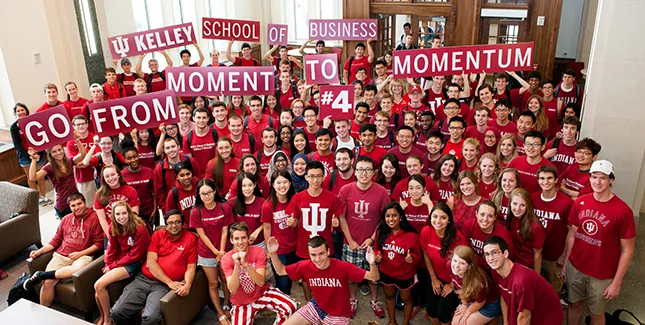
Indiana University’s Kelley School of Business students. Courtesy photo
In July, NBA players, coaches, and team staff members traveled to Walt Disney World to live, train, and perform in what is known as the “NBA Bubble.” The 16 teams that made the playoffs are restricted to the bubble and won’t leave until the end of their respective seasons, according to Popular Mechanics.
This has become the new normal for the NBA season amidst a global health pandemic. As sports arenas closed and large gatherings were banned, the league was forced to adapt and think of creative ways to allow its consumers to safely engage with sports games and players to play without fear of contracting the virus.
That idea of adapting to a crisis is something that Nathaniel Grow, associate professor of Business Law and Ethics Yormark Family Director of the Sports Industry Workshop at Indiana University’s Kelley School of Business, says is an especially important lesson for B-school students interested in working in the sports industry to learn.
“It teaches them that in this business there’s always a crisis mode,” Grow says. “If you’re an NBA team and your whole marketing campaign is based around the star player who then injures his leg and is out for the whole season, that’s a mini-crisis you have to deal with. I think allowing the students to use this as a case study can offer a particularly unique educational opportunity.”
This fall, the Kelley School of Business added a brand-new Sports Industry Workshop to its offering of 14 various workshops in industries such as investment banking and management consulting. The Sports Industry Workshop provides a unique, immersive experience for highly motivated Kelley undergraduate students intent on pursuing a career in the sports industry, familiarizing them with the latest trends in the dynamic and multifaceted field.

Nathaniel Grow of Indiana’s Kelley School of Business
BUSINESS STUDENTS GET ‘FIRST-HAND’ OPPORTUNITY TO LEARN FROM PROFESSIONALS
The workshop is geared towards business students’ junior year of study, with applications opening during their spring sophomore year. Interested students apply with an essay and, if selected, enter an interview process. Kelley hopes to admit roughly 20 to 25 students per year in the workshop. For this year’s inaugural class, 19 students will meet virtually once a week and hear from guest speakers in the sports industry ranging from media rights to sports marketing.
This semester’s guest speakers include Eric Shanks, CEO and Executive Producer of FOX Sports and Brett Yormark, President of Business Operations and Strategy at Roc Nation, and co-CEO of Roc Nation Unified, to name a few.
“We have different people in these areas talk about what their job is like, the types of issues they run into, and where they see things going in the future,” Grow says. “It gives students the opportunity to learn first-hand from professionals.”
Additionally, students will partake in group projects where they analyze each of the five major U.S. pro sports league’s bargaining agreements with players and present their findings to the class.
For this fall’s capstone project, students will compile, gather, and synthesize data around sports viewers demographics and put together a 20-page industry analysis of the current trends and business models around the sports industry.
Grow says he initially had plans for travel opportunities to tour sports facilities and league offices in Indianapolis. However, due to the pandemic, he instead hopes to host a virtual conference this Spring for students to network with professionals in the industry.
BREAKING INTO THE INDUSTRY
The sports industry is notorious for being tough to break into. But, as Grow notes, that there are numerous paths one can take to work in the industry. And that’s something he hopes to students will learn and be exposed to through the workshop.
“It’s not just about working for one of the major professional sports teams, but rather, there are a lot of sport-adjacent firms and businesses that touch on the sports industry beyond just traditional sports teams themselves,” he says.
In particular, the sports industry is getting more sophisticated in the sense that organizations and businesses are increasingly interested in hiring grads who have a general business background rather than just a sports management or marketing background.
That’s exactly what Kelley’s Sports Industry Workshop is hoping to accomplish: supply the sports industry with students who note only have knowledge of the industry, but a strong foundational training in business.
“We’re doing something that is different than what anyone else is doing right now,” Grow says. “We’ve got a top 10 undergraduate business program with a ton of really smart kids getting an undergraduate level business training and we are taking that and exposing them to the latest trends and issues within the sports industry. That makes them particularly attractive as opposed to someone who is only focused on sports marketing and hasn’t necessarily been exposed to the latest general marketing trends.”
The Sports Industry Workshop at Kelley is a unique experiment to see how a B-school can train undergraduate business students for an industry that has seen immense adaptation and growth in uncertain times.
And Grow is hopeful that Kelley grads intent on entering the industry will have what it takes.
“They’re not only going to have the broad-based marketing, finance, and business analytics training, but they’re also going to talk to professionals, understand what the necessary skills are, and what issues are relevant,” he says. “I’m hoping that combination helps them stand out on the job market.”
DON’T MISS: WHY THIS MIDWESTERN BUSINESS SCHOOL NOW REQUIRES ‘CULTURAL INTELLIGENCE’ or DURING THE ‘SUMMER OF NOTHING’ A UNIQUE BUSINESS CAMP FOR HIGH SCHOOLERS











Questions about this article? Email us or leave a comment below.